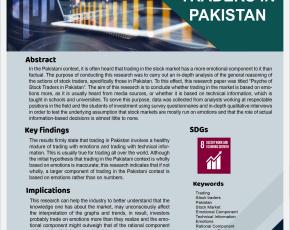Abstract
In the Pakistani context, it is often heard that trading in the stock market has a more emotional component to it than factual. The purpose of conducting this research was to carry out an in-depth analysis of the general reasoning of the actions of stock traders, specifically those in Pakistan. To this effect, this research paper was titled “Psyche of Stock Traders in Pakistan”. The aim of this research is to conclude whether trading in the market is based on emotions more, as it is usually heard from media sources, or whether it is based on technical information, which is taught in schools and universities. To serve this purpose, data was collected from analysts working at respectable positions in the field and the students of investment using survey questionnaires and in-depth qualitative interviews in order to test the underlying assumption that stock markets are mostly run on emotions and that the role of actual information-based decisions is almost little to none.
Key findings
The results firmly state that trading in Pakistan involves a healthy mixture of trading with emotions and trading with technical information. This is usually true for trading all over the world. Although the initial hypothesis that trading in the Pakistani context is wholly based on emotions is inaccurate; this research indicates that if not wholly, a larger component of trading in the Pakistani context is based on emotions rather than on numbers.
Implications
This research can help the industry to better understand that the knowledge one has about the market, may unconsciously affect the interpretation of the graphs and trends, in result, investors probably trade on emotions more than they realize and the emotional component might outweigh that of the rational component while making their investment decisions.













